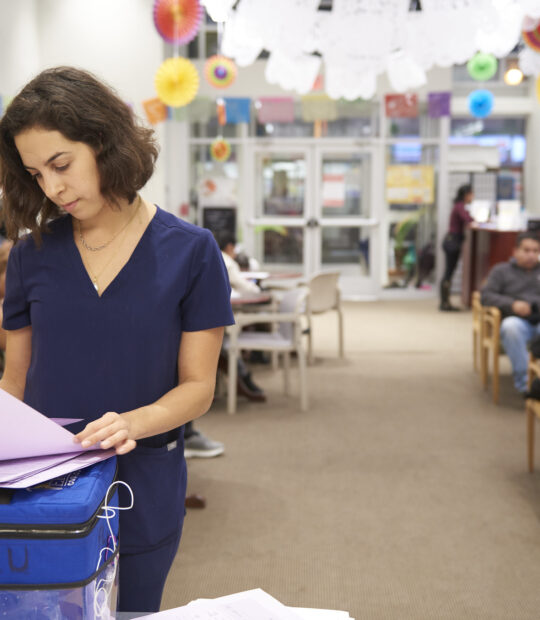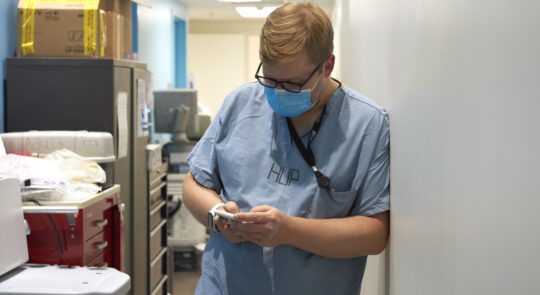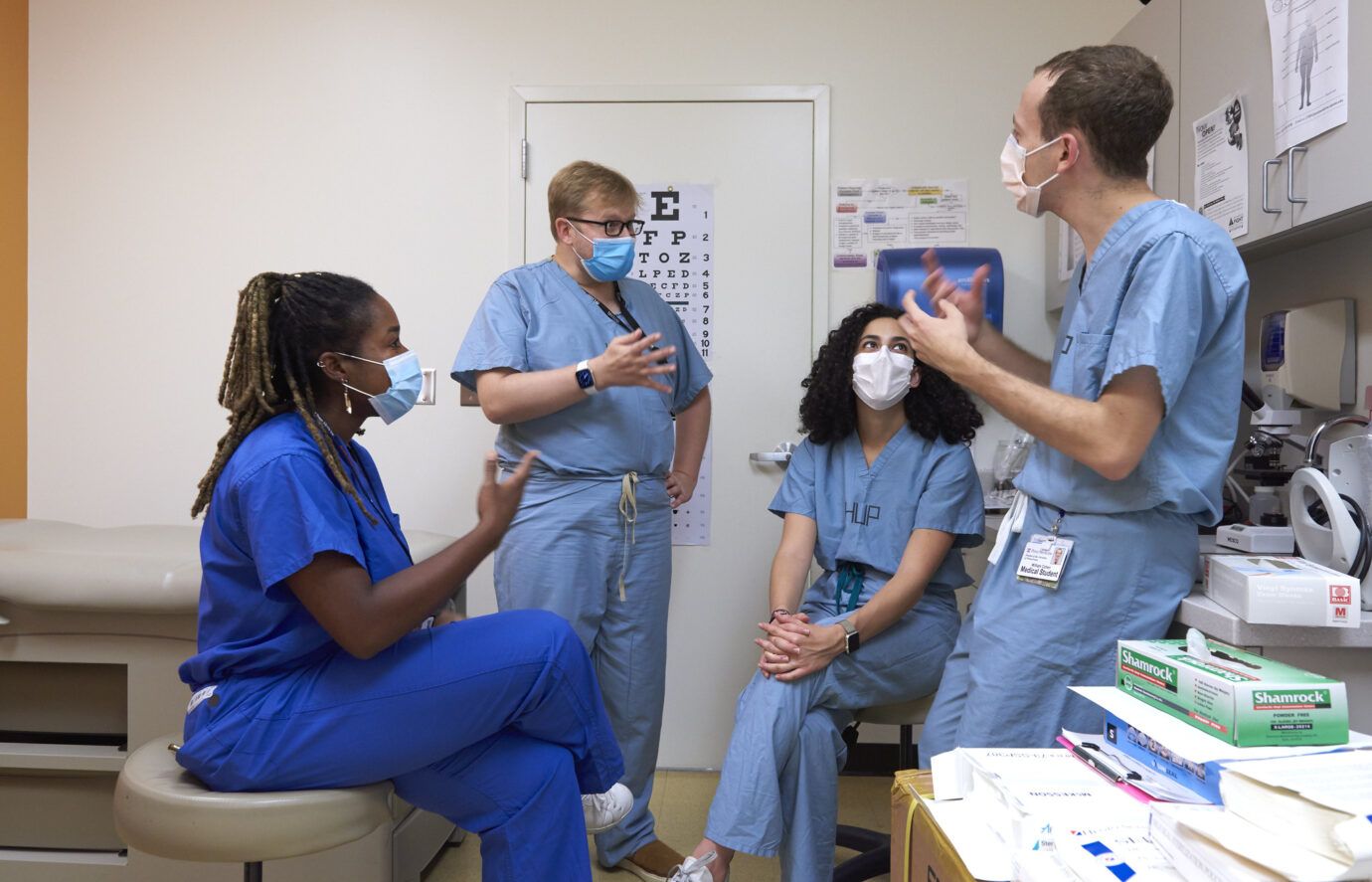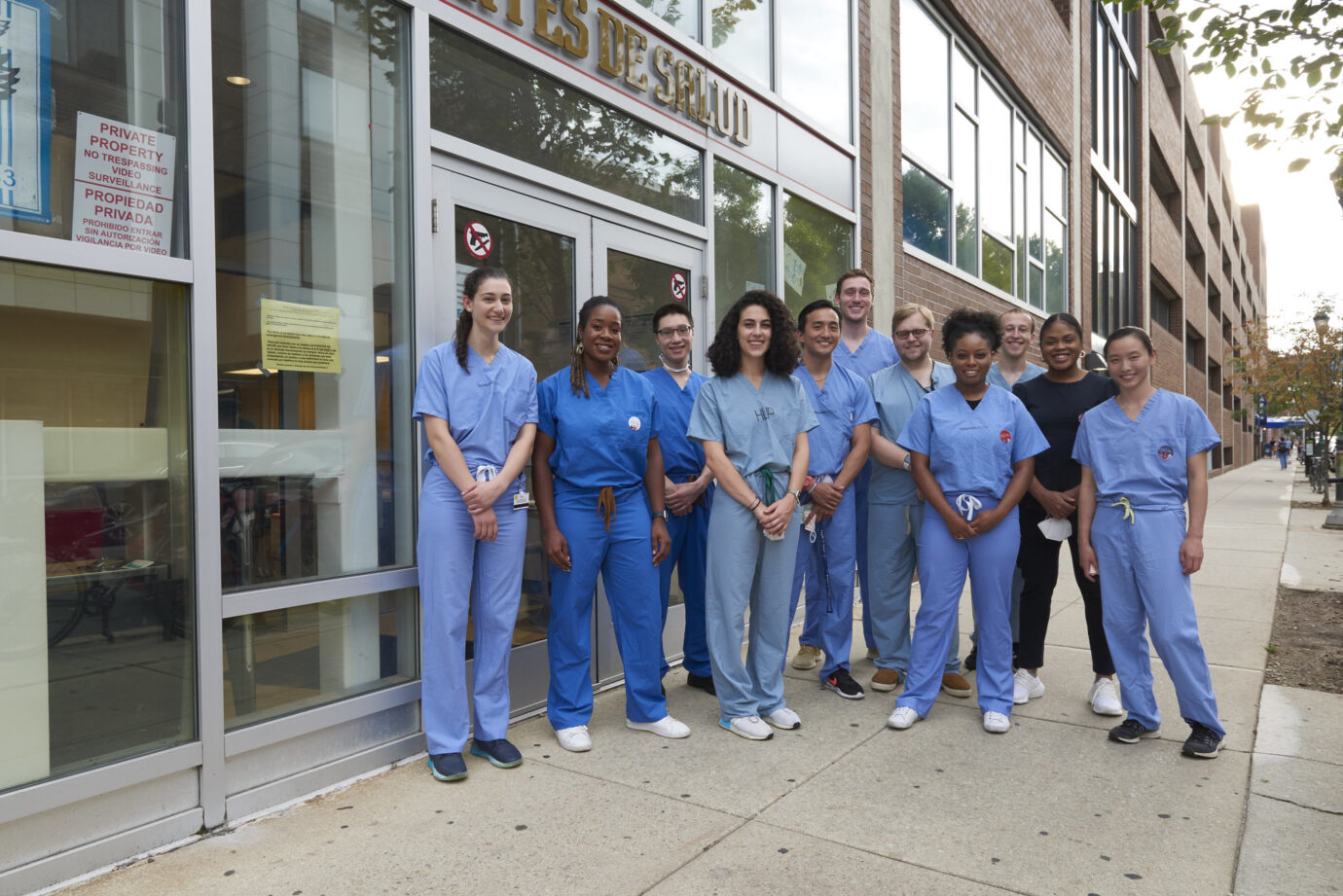

On a September day in 2020, a customer at a Philadelphia restaurant sent back an order of chicken wings. José, now 51, working in the kitchen that day, decided to eat the wings himself — even though he sometimes noticed that greasy foods seemed not to agree with him. Soon after, he felt a piercing pain in his back unlike any he’d experienced before. “I lost control of my thoughts,” José said. His son rushed him to the hospital.
There are many reasons why José hadn’t gone to the doctor for this problem before. He didn’t think it was all that serious. He also didn’t have health insurance or a primary care provider to consult with on non-emergency medical issues. José, who immigrated to the United States from Mexico in 1999 and now lives in East Falls, speaks little English (he was interviewed with the help of a Spanish translator and asked not to use his full name), and would need the help of an interpreter at doctor visits. There was little time in José’s work schedule to navigate even one of these barriers, let alone all of them.
That’s how José came to the Roxborough Memorial Hospital emergency department that day in September over a year ago — desperate and in the worst pain of his life. After he was stabilized, José learned that the problem was his gallbladder and that the treatment was surgery to remove the organ. But if just accessing primary care was a difficult hill for José to climb, arranging and paying for a major surgery felt downright insurmountable. What was more likely, though far from ideal, José thought, was that he’d deal with the intermittent pain until his gallbladder eventually ruptured, sending him back to the hospital for a life-saving medical intervention.
After José was released from the emergency room, a friend told him about Puentes de Salud, a Spanish-language community center that serves many undocumented immigrants at 17th and South Streets in Philadelphia. The friend thought the health care providers at Puentes might be able to help José get his much-needed surgery. The clinic’s staff soon connected him with Penn Medicine’s Center for Surgical Health, a new program with the goal of connecting underserved patients like José with the surgical care they need but struggle to access.



The Center for Surgical Health grew out of a Perelman School of Medicine free clinic called the University City Hospitality Coalition, which provides medical consultations for uninsured patients. Patients would come to the clinic with complex surgical needs but few tools with which to navigate the health care system, said Alan Herbst, MD, now a Penn general surgery resident who had volunteered at the free clinic when he was a medical student.
“These patients are stuck,” Herbst said, under a “mountain of barriers.”
Maybe instead of expecting these underserved patients to find their way to surgery through a web of complexities, the students thought, we could promote health equity by bringing surgery to them. It took a few years to lay the groundwork — and a full year to get the first patient to surgery — before the Center for Surgical Health officially launched.
The center, housed in the Department of Surgery, is thought to be the first of its kind. The team, now comprised of some 150 volunteer faculty, residents, medical students, and graduate students, knows of no other academic medical center that has a program guiding underserved patients from pre- to post-surgery. When patients are able to schedule planned surgeries, instead of coming to the emergency room only after their conditions have escalated, they are more likely to have shorter hospital stays, a quicker return to work, and more financial stability.

At the core of the center’s work is the “personal patient navigator.” The navigator, usually a medical student, helps pave the patient’s way from the initial referral to the operating room and through post-operative care. José’s navigator was Linda Saikali, a second-year medical student who now leads the center’s women’s health division. Saikali said she volunteers with the center, in part, because she’s considering a career in surgery. “That,” she said, “combined with the direct way this organization helps reduce disparities in the community, was really appealing to me.”
Saikali met José in the spring of 2021. Along with arranging and attending most of José’s medical appointments, Saikali’s role also included proactively securing him the means to pay for the health care he would need. The center was designed to help connect patients whenever possible to federal and state programs for emergency, temporary health insurance, which can cover the preoperative to postoperative period. Connecting with public programs for patients who are eligible ties into the goal of making the program’s model more sustainable, according to the center’s leaders, because available financial assistance from Penn Medicine can stretch farther for those who have gaps or lack other options. It also serves the goal of making the program’s model more adaptable to other organizations that may seek to replicate its support for such underserved patients.
Beyond navigating appointments and insurance, the student navigators can help patients with a wide range of needs that may crop up along the way, from securing transportation to appointments, to explaining what to expect, to attending preoperative consultations at their side.

Perelman School of Medicine student Lily Owei, surgical resident Alan Herbst, MD, and medical students Linda Saikali and Will Cohen
José, who refers to Saikali as “Miss Linda,” said knowing he had a guide in this process made all the difference. “She made me feel safe,” he said.
When the time came for José’s outpatient surgery in July 2021 at the Perelman Center for Advanced Medicine, Saikali scrubbed in along with surgeon Jon B. Morris, MD, the Center’s director and the Ernest F. Rosato-William Maul Measey Professor in Surgical Education in the Department of Surgery at Penn Medicine.
José is now among the 86 patients who have undergone a total of 95 surgical procedures with the help of the center. Olivia Katz, a fourth-year medical student and associate director of the center’s clinical operations, said she loves to see the faces of her patients after their much-needed surgeries. “You’re there in the flesh to see all the progress they’ve made,” said Katz, who is applying to residency in general surgery.
Another 66 patients are currently on the docket, awaiting surgeries in one of the specialties represented at the Center: general surgery, otolaryngology, orthopedics, plastic surgery, urology, and women’s health. Each specialty hosts a clinic once or twice a month to assess patients who have been referred with possible surgical problems by the center’s community partners, like the providers at Puentes. If the patients are confirmed to be in need of surgical care, they are each assigned to a patient navigator who will start the process of scheduling appointments with Penn surgeons and securing insurance.

Penn medical students and residents who volunteer with the Center for Surgical Health include Olivia Katz, Lily Owei, Kevin Zhang, Linda Saikali, Austin Cao, Mitchell Johnson, Alan Herbst, MD, Canada Montgomery, Will Cohen, Ginikanwa Onyekaba, and Katie Krupp.
Though the center’s clinical arm is currently its biggest, the program also has other key facets. Behind the scenes, the center’s policy wing is advocating to make health insurance more broadly accessible to immigrant communities, said Sara Ginzberg, MD, a general surgery resident and the center’s policy lead. Patients who receive emergency insurance — mostly undocumented pregnant people and those who make too much money to qualify for Medicaid — only get it for one specific need, she said. Then, they’re uninsured once again.
The center’s education arm is working to educate medical students about surgery equity, starting with a lecture series at the Perelman School of Medicine. The research arm is collecting data to track patient outcomes and cost savings for the hospital. The center is on track to keep growing in 2022, with the long-term goal of serving as a model for a new way of delivering surgical care to the underserved in cities across the country. The scale of unmet need may be vast: In the city of Philadelphia, one in 10 people is uninsured.
For his part, José said the gallbladder surgery he had with the help of the center was life-changing — and not only in terms of his health. The experience, he said, reminded him of the good people in the world. “I am,” José said, “very thankful.”







